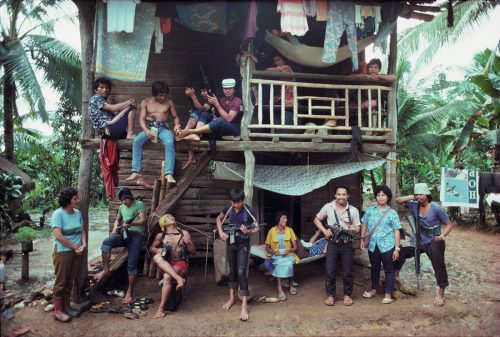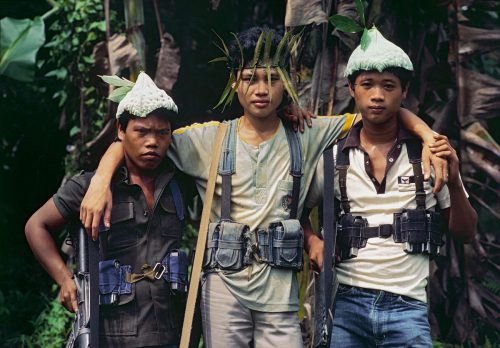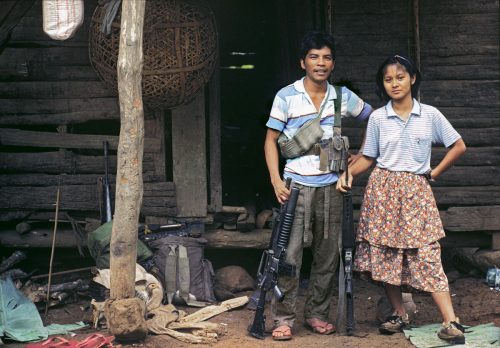
A film that takes viewers back to scenes of the political and social unrest after the EDSA People Power revolution, fresh from the overthrow of Ferdinand Marcos and the victory of Cory Aquino is part of the opening program of Daang Dokyu, the Philippines’ first documentary festival of its kind.
A Rustling of Leaves: Inside the Philippine Revolution, a documentary made in 1988 by acclaimed Canadian documentary filmmaker Nettie Wild waited three decades to finally have its Philippine debut as part of the opening activities of Daang Dokyu, with the theme “Martial Law, Never Again.”
“It is only now that the film will face its most important audience – the Filipinos. It’s time for A Rustling of Leaves to come home. It’s only a pandemic that stops me from being on a plane to be in the Philippines for this first official screening of A Rustling of Leaves in the Philippines. I dedicate these digital screenings to the Filipinos who offered friendship to me, an outsider. During the making of the film, we were following very big, important stories, but we were also finding stories that were surprising and not being covered by the mainstream media. Perhaps these stories can provide a way of making sense of this extraordinary chapter in the Philippines’ history,” says Wild.

The documentary was filmed in 1987, a year after Mrs. Aquino came to power and the dictatorship of Ferdinand Marcos was overthrown. It follows the lives of Kumander Dante, founder of the guerrilla New People’s Army; Father Navarro, rebel priest and guerrilla fighter; and Jun Pala, a radio deejay and the voice of the “Anti-Communist Crusade” and right-wing death squads in Davao. Also featured in the film are former radical priest Ed dela Torre and the young lieutenant, now senator, Ronald dela Rosa.
The film won the People’s Choice Award at the 1989 Berlin International Film Festival, given the Prix du Public award on the 50th anniversary of the National Film Board of Canada. It also won the Grand Prize at the Houston Film Festival and Best Cinematography at the Society of Canadian Cinematographers. It then went on to be featured at film festivals around the world.
According to Jewel Maranan, festival director of Daang Dokyu, “Before foreign film productions started looking into the political situation in the Philippines, there was A Rustling of Leaves. In my opinion, no sharper and more in-depth analysis of our nation’s conflicts and contradictions has been made in film than this distinctive documentary by Canadian filmmaker Nettie Wild. We are screening it now at Daang Dokyu, 32 years late, but it remains very relevant today. It is an important film for people seeking to understand the roots of conflicts in the country and for those concerned about the peace process.”

The film will have an introduction from the filmmaker. A question and answer with Prof. Roland Tolentino, member of the Manunuri ng Pelikulang Pilipino, will also be screened side by side with her film.
The online screenings are set from September 19 to 21.
Other featured documentaries in the program are Kiri Dalena’s Alunsina (2020), ABS-CBN’s documentary Marcos: A Malignant Spirit (1986), Lito Tiongson’s Mendiola Massacre (1987), and Ramona Diaz’ Imelda (2003).
A Rustling of Leaves: Inside the Philippine Revolution will also have a re-run from October 9 to 15 as part of Daang Dokyu’s festival proper.
It was produced in association with Channel 4, Great Britain, with the participation of Telefilm Canada, and with the further assistance from the National Film Board of Canada and the Canada Council (Media Arts and Explorations Program.) Music is provided by Joey Ayala, The Hot Dogs, Salvador Ferreras, Rob Porter, David Byrne and the Talking Heads, The Bee Gees.
“Unusually entertaining, sophisticated, original, edited with style, Nettie Wild collected truly unique scenes of the life of the revolutionary underground movement. She witnessed military attacks as well as central public appearances by Aquino. Her conversations with diverse and key political figures bear an unusual authenticity, even privacy. It is an achievement which stems from the obvious diplomatic skills conveyed by this young actress/director.”
Los Angeles Times described the film as “disturbing, comprehensive, illuminating…. a raw immediacy that is engaging, fair-minded.”
Hollywood Reporter writes that the film “clips along at a refreshingly fast gait and sparkles with deadpan wit and shrewd observations“. It also said it added “a further wallop of panache and comic editorial counterpoint to the production is the film’s eclectic and zippy music, including selections from Filipino composer Joey Ayala, together with David Byrne and the Talking Heads and the Bee Gees.”
Der Tagesspiegel of Germany calls the film first-class documentary. It said the film “offers a text-book sample of revolution and counter revolution.”
More information about this film festival that showcases a selection from the largest collection of Philippine documentaries from the past one hundred years is available at daandokyu.ph.
Streaming now at daangdokyu.com/watchnow.
Daang Dokyu is initiated by the Filipino Documentary Society (FilDocs), founded by documentary filmmakers Kara Magsanoc-Alikpala, Baby Ruth Villarama, Coreen Jimenez and Jewel Maranan.
The festival is made possible with the support and partnership of the Office of House Deputy Speaker Congresswoman Loren Legarda, National Commission for Culture and the Arts, UP Film Institute and Probe Media Foundation, Inc.
“Martial Law, Never Again, is co-presented by the Concerned Artists Association of the Philippines and the Directors’ Guild of the Philippines, Inc.

